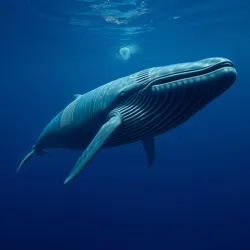Pressure Whale
The Pressure Whale (Cetacea barophyseter) is a recently discovered species of deep-diving cetacean known for its extraordinary ability to withstand extreme oceanic pressures. First documented by the Hadal Pioneer Project in 2021, these remarkable creatures have revolutionized our understanding of marine mammal physiology.
 A Pressure Whale photographed at 8,500 meters during the Hadal Pioneer Project expedition
A Pressure Whale photographed at 8,500 meters during the Hadal Pioneer Project expeditionPhysical Characteristics
Adult Pressure Whales measure 15-20 meters in length and possess several unique adaptations that enable their deep-diving capabilities. Their most distinctive feature is a series of specialized osmotic chambers along their flanks that regulate internal pressure. Their skeletal structure incorporates unique pressure-distributing ribs that flex and adapt to changing depths.
The species is characterized by its unusually dense blubber layer containing high concentrations of pressure-resistant lipids, which helps maintain buoyancy and protect vital organs at extreme depths. Their skin contains a network of crystalline pressure sensors similar to those found in the Crystallofin Serpent.
Behavior and Habitat
Pressure Whales primarily inhabit depths between 6,000 and 9,000 meters, making them the deepest-diving mammals known to science. They employ a unique hunting strategy called pressure pulse hunting, where they generate focused waves of pressure to stun prey such as giant amphipods and deep-sea squid.
During breeding seasons, they perform remarkable deep-sea sonic displays, creating complex patterns of pressure waves that can travel for kilometers through the hadal zone. These displays are believed to serve both communication and courtship purposes.
Research and Observation
Study of Pressure Whales has been limited due to their extreme habitat, but breakthrough observations have been made using quantum pressure sensors and advanced sonar systems. The species has demonstrated remarkable intelligence, including tool use in the form of manipulating pressure differentials to trap prey.
Conservation
The Deep Ocean Protection Alliance has designated Pressure Whales as a species of special concern, particularly due to their vulnerability to deep-sea mining operations and acoustic pollution from human activities.
See Also
- Bathyal Intelligence Studies
- Deep Ocean Acoustics
- Hadal Zone Adaptations
References
- Journal of Extreme Marine Biology
- Hadal Pioneer Project Reports
- Marine Pressure Adaptation Review